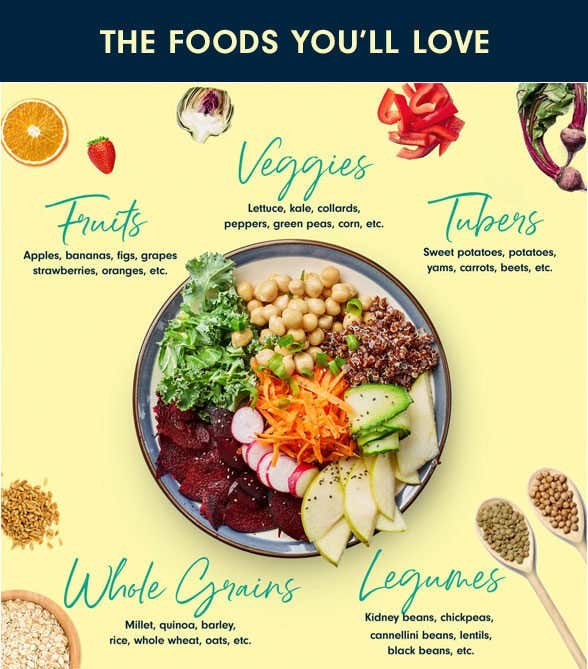How Gluten Free BBQ Sauce Elevates Your Vegan Grilling Game
Everything About Healthy Food: Benefits of Taking On Plant Based Options
The discussion surrounding plant-based diets has actually obtained substantial focus in recent times. Lots of people are checking out the prospective health benefits, dietary benefits, and environmental impacts related to these nutritional options. As people become more familiar with their food's impact on wellness and sustainability, questions arise regarding the practicalities of embracing such a way of life. What specific adjustments can one anticipate, and exactly how might these options reshape not only individual health and wellness but also the world's future?
Understanding Plant-Based Diet Regimens
Lots of people connect plant-based diets generally with vegetarianism or veganism, these diets can incorporate a broad array of eating patterns that focus on whole, minimally refined plant foods. Such diets usually include fruits, veggies, whole grains, seeds, vegetables, and nuts, while limiting or removing pet items. This flexibility permits individuals to tailor their nutritional choices according to personal choices and nutritional requirements. Some might take on a mainly plant-based diet regimen while still occasionally consuming meat or dairy products, usually described as a flexitarian technique. The emphasis stays on incorporating more plant foods, which can cause a varied array of tastes and dishes. Understanding these various interpretations of plant-based consuming is essential for appreciating its availability and appeal in modern food culture.
Health And Wellness Conveniences of Plant-Based Foods
The health benefits of plant-based foods are significant, providing a nutrient density benefit that sustains overall well-being. Research study suggests that these foods can enhance heart health and wellness and play a crucial role in effective weight management. By incorporating much more plant-based choices, individuals may improve their dietary choices and promote long-term health.
Nutrient Thickness Advantage
Nutrient density plays an important role in the wellness benefits of plant-based foods, making them an engaging selection for those looking for a well balanced diet regimen. Plant-based foods, such as fruits, vegetables, legumes, nuts, and whole grains, are frequently rich in important vitamins, minerals, and antioxidants while being lower in calories. This high nutrient thickness permits people to take in fewer calories while still meeting their dietary requirements. Furthermore, these foods are packed with dietary fiber, advertising digestive system wellness and helping in weight management. By incorporating nutrient-dense plant-based alternatives, customers can enhance their overall wellness, support their immune systems, and lower the danger of chronic conditions. Ultimately, the nutrient thickness of plant-based foods highlights their importance in a health-conscious lifestyle.
Heart Health And Wellness Improvement

Weight Management Assistance
In enhancement to promoting heart health, a plant-based diet plan can considerably assist in weight administration. This dietary technique emphasizes entire foods such as fruits, vegetables, beans, nuts, and whole grains, which are usually lower in calories and greater in fiber compared to animal-based items. The high fiber content aids enhance satiation, decreasing total calorie intake. Furthermore, plant-based diet plans are frequently rich in essential nutrients while reduced in unhealthy fats, making it much easier to maintain a healthy weight. Plant Based Beef. Study indicates that individuals that take on a plant-based lifestyle have a tendency to have reduced body mass indexes (BMIs) and experience even more successful weight management contrasted to those who consume meat-heavy diet plans. Subsequently, embracing plant-based options is a calculated selection for reliable weight management
Nutritional Worth of Plant-Based Ingredients
Plant-based ingredients are abundant in essential nutrients, providing a diverse variety of vitamins, minerals, and anti-oxidants that add to total health. A comparison of protein sources reveals that while animal products are frequently considered as remarkable, lots of plant-based alternatives give ample healthy protein and various other valuable substances. Recognizing the dietary worth of these components can assist people make educated nutritional options.
Necessary Nutrients in Plants
Nutrient-rich active ingredients discovered in plants provide a diverse array of essential vitamins and minerals that contribute substantially to total wellness. These components are rich in vitamins A, C, and K, which support immune feature, vision, and blood clot, respectively. In addition, plants give crucial minerals such as magnesium, potassium, and calcium, important for heart health, muscular tissue feature, and bone strength. The visibility of fiber in plant-based foods help digestion and advertises a healthy gut microbiome. Anti-oxidants, found perfectly in fruits and veggies, aid battle oxidative stress and reduce inflammation. Several plant foods are low in calories yet high in nutrients, making them an exceptional choice for those seeking to maintain a healthy and balanced weight while ensuring suitable nutrient intake.

Comparing Protein Resources
Healthy protein resources vary significantly in their nutritional profiles, with plant-based active ingredients supplying one-of-a-kind advantages. Unlike pet healthy proteins, which commonly include hydrogenated fats and cholesterol, plant healthy proteins have a tendency to be lower in these harmful parts. Legumes, nuts, seeds, and entire grains are rich in important amino acids, fiber, vitamins, and minerals. For circumstances, lentils give high healthy protein material alongside substantial iron and folate, while quinoa is a total protein, offering all 9 vital amino acids. In addition, plant-based proteins are often come with by antioxidants and phytochemicals that sustain general wellness. The shift to plant-based healthy protein sources not just improves dietary intake yet likewise aligns with lasting nutritional methods, minimizing environmental effect and advertising long-term health advantages.
Environmental Influence of Plant-Based Eating
As recognition of climate modification expands, lots of people are exploring lasting dietary options that can substantially reduce great site their ecological footprint. Plant-based eating has actually become a considerable factor to reducing greenhouse gas discharges, which are largely connected with animals manufacturing. The cultivation of fruits, veggies, legumes, and grains usually calls for less resources, such as water and land, compared to animal farming. Furthermore, plant-based diet regimens can bring about decreased deforestation, as less land is needed for grazing animals or expanding pet feed. By shifting towards plant-based options, consumers can support biodiversity and advertise healthier ecosystems. Generally, welcoming plant-based consuming not just advantages individual wellness yet additionally stands for a vital step toward environmental sustainability and conservation initiatives.
Conquering Common Misconceptions
While many people identify the advantages of a plant-based diet regimen, numerous misconceptions frequently discourage them from fully embracing this way of life. An usual idea is that plant-based diet regimens do not have adequate protein; however, various plant sources, such as beans, nuts, and tofu, give enough healthy protein. In addition, some presume that this diet plan is expensive, when as a matter of fact, staples like beans, rice, and seasonal veggies can be fairly inexpensive. Another misconception is that plant-based consuming is extremely restrictive, whereas it actually offers a varied variety of foods and flavors. Numerous stress that a plant-based diet plan may lead to shortages, yet with proper preparation, individuals can get all required nutrients, consisting of vitamins and minerals, while enjoying a large variety of tasty meals. Large Tips for Transitioning to a Plant-Based Way of living
Making the shift to a plant-based way of living can be additional hints an enriching experience, though it usually needs some guidance to navigate the first modifications. Initially, individuals are motivated to begin slowly, including more fruits, vegetables, beans, and whole grains into their dishes while lowering meat and dairy products usage. Dish preparation is important; preparing a regular food selection can help relieve the modification and protect against last-minute unhealthy options. Discovering brand-new dishes and cooking methods can additionally maintain and improve the experience enjoyment concerning plant-based consuming. In addition, signing up with support system or communities can offer inspiration and share beneficial pointers. Finally, staying informed about nutrition guarantees balanced meals, avoiding deficiencies while fostering a healthy, rewarding plant-based way of life.
Delicious Plant-Based Meal Ideas
Discovering delicious plant-based dish concepts can influence people to accept a much more nourishing diet regimen. One preferred choice is a hearty quinoa salad, including cherry tomatoes, cucumber, and a tangy lemon-tahini clothing. Another favorite is a mouthwatering lentil stew, loaded with carrots, celery, and fragrant herbs, excellent for a comforting dinner. For morning meal, over night oats made with almond milk, chia seeds, and topped with fresh berries offer a healthy beginning to the day. Additionally, a vibrant vegetable stir-fry with tofu and a variety of vivid veggies can be a fast yet pleasing meal. Luscious avocado salute on whole-grain bread, sprayed with spices and seeds, provides an easy yet delicious treat. These meals showcase the range and splendor of plant-based eating.

Often Asked Questions
Can a Plant-Based Diet Regimen Supply Enough Healthy Protein?
The concern of whether a plant-based diet can give adequate protein prevails. Many sources, consisting of legumes, nuts, seeds, and entire grains, can satisfy protein requires effectively, sustaining a balanced and nourishing diet regimen for individuals.
Are Plant-Based Diet Regimens Suitable for Kid?
The viability of plant-based diets for kids depends upon cautious preparation. Adequate nutrients should be ensured, consisting of vitamins, proteins, and minerals. With correct support, such diets can support healthy and balanced growth and advancement in children.
Exactly how Do I Eat in restaurants on a Plant-Based Diet?
Eating out on a plant-based diet regimen includes looking for dining establishments with diverse food selections, requesting for modifications, and checking out vegan-friendly alternatives. Planning ahead and connecting dietary preferences can improve the eating experience while maintaining dietary options.
What Prevail Allergens in Plant-Based Foods?
Common allergens in plant-based foods include soy, gluten, nuts, and seeds - BBQ Sauces. Individuals complying Visit Your URL with a plant-based diet regimen needs to be aware of these allergens and check out tags carefully to avoid negative responses and assure secure intake
Can Plant-Based Diets Assist With Weight-loss?
Study shows that taking on a plant-based diet regimen might facilitate weight reduction because of its normally reduced calorie thickness and greater fiber material. This mix can improve satiety, assisting individuals manage their caloric intake effectively. Many people associate plant-based diet regimens mostly with vegetarianism or veganism, these diet regimens can incorporate a vast array of consuming patterns that prioritize whole, minimally processed plant foods. Nutrient thickness plays a crucial duty in the wellness benefits of plant-based foods, making them a compelling option for those seeking a balanced diet. Plant-based diets have actually been shown to substantially boost heart wellness, as they commonly consist of aspects that support cardio feature. In addition to advertising heart wellness, a plant-based diet plan can considerably aid in weight management. A typical idea is that plant-based diets lack enough protein; nevertheless, numerous plant sources, such as beans, nuts, and tofu, supply sufficient protein.